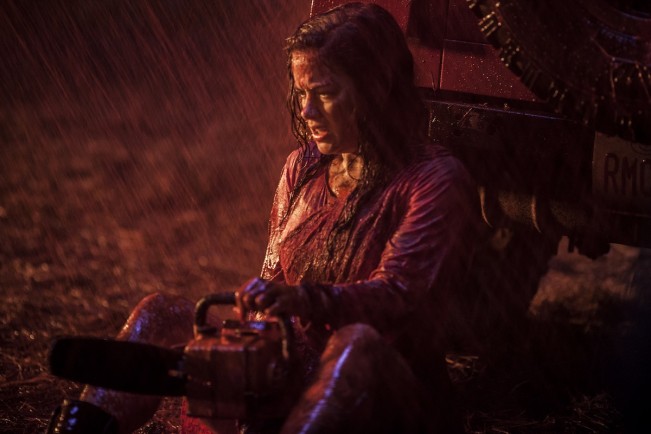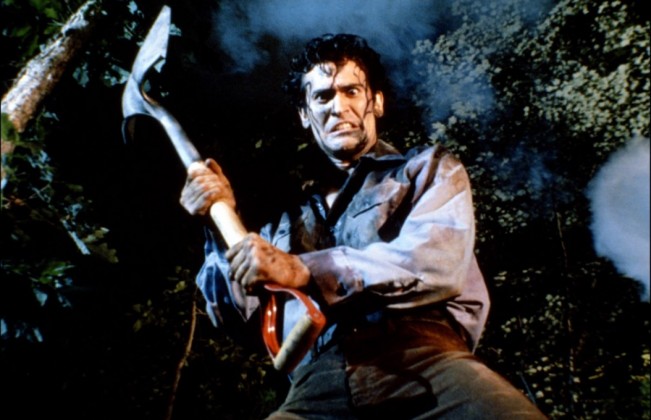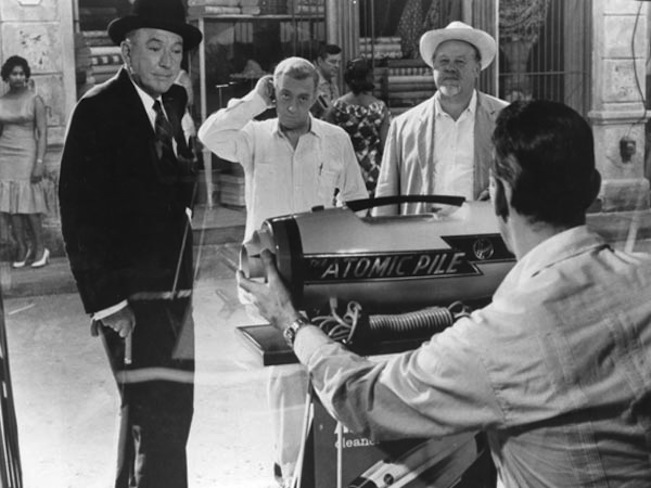

By Mike Wilmington Wilmington@moviecitynews.com
Wilmington on DVDs: Our Man in Havana; Evil Dead (2013); The Evil Dead
OUR MAN IN HAVANA (Three Stars)
U.K.-U.S.: Carol Reed, 1959 (Columbia/Sony)
Our Man in Havana, a dark 1959 comedy starring Alec Guinness, about spying and murder and vacuum cleaners in pre-revolutionary Cuba, was the first film that the great British thriller writer Graham Greene and his favorite director Carol Reed made together after their 1949 masterpiece The Third Man. And one thing that has to be said about it is that it’s no Third Man. As a spy thriller, it’s not as suspenseful, and even as a comedy, it’s not all that funny.
That doesn’t mean it’s a bad film, or even a mediocre one. It’s just not as good as we want it to be, not as good as The Third Man—which is a film deliciously tense and highly dramatic and sometimes scathingly witty, and beautifully sad as well—and which has a really wonderful cast (Cotten, Welles, Trevor Howard and Valli), and gorgeously dark and angled cinematography by Robert Krasker, and that hauntingly twangy zither music by Anton Karas. At least one group of British critics selected The Third Man as the finest British picture of all time. (They may be right, though I‘d also put in a word for Lawrence of Arabia and The Red Shoes and The 39 Steps and Kes and A Hard Day‘s Night.)
But perhaps we’re too aware of The Third Man as an antecedent to Our Man in Havana. We expect too much and miss what’s there—which is a good amount of intelligence, wit, suspense, romance, political savvy (Greene himself was a British secret agent, like Alec Guinness’s James Wormold here), elegant black and white Havana location photography by Oswald Morris and a pretty wonderful, if more uneven, cast of its own: Guinness as Wormold the vacuum cleaner salesman turned reluctant spy, Maureen O’Hara as his affair-minded assistant spy, Ralph Richardson and Noel Coward as the maladroit spymasters who hire and employ him, Burl Ives as Wormold‘s best friend, Dr. Hasselbacher, Paul Rogers as a friendly assassin and Ernie Kovacs as the urbane, sadistic Cuban head cop, Captain Segura, who’s in love with Wormold’s free-spending daughter Milly (Jo Morrow).
There are two bits of miscasting. Burl Ives, who was great as Tennessee Williams’ Big Daddy, doesn’t have the entire accent for Hasselbacher and he plays his one mournful note too dolorously. And Jo Morrow can’t make you think she’s a British teenager (even when Wormold “explains” that she picked up her accent in America) or forget that she wound up in movies like For Those Who Think Young. Most of this unusually talented cast though seem to be having fun, especially Guinness, Coward and Richardson—and, more surprisingly, Ernie Kovacs, who’s so good he makes you forget he isn’t Cuban, isn’t cop, and doesn’t seem at first to belong in a Graham Greene movie.
The time of Our Man in Havana is the 1950s, under the Batista regime. The main character, Wormold, is a typical “split,“ guilt-ridden Greene character, played by Guinness with some of the introverted whimsy he put into the role of the fussy inventor in the beautiful little Ealing Studio comedy The Man in the White Suit. Because Milly spends too much money, Wormold, a man of little political intensity (it doesn‘t bother him that Hasselbacher is a World War I German Army veteran), allows himself to be recruited by a local MI6 agent, Hawthorne (Coward) a nimble agent who seems to do most of his recruiting in bars and men‘s rooms.
Hawthorne hires Wormold, though Wormold has no experience and no contacts—possibly because he seem the right sort of chap—and assigns him to put together a spy team for MI6, which is run back in England by the dithering “C” (Richardson). Wormold, unable to recruit or spy on anybody, hits on the temporarily successful stratagem of simply making up an agent list, or putting on it people with whom he has no connection—who hits on the stratagem of simply making all his spy team up, putting people on it he doesn’t know or who don’t exist and writing up incidents that never happened in his phony reports—along with the plans for what looks like fictional weaponry but is actually one of his vacuum cleaners.
So convincing are all Wormold’s fantasies and absurd inventions that MI6 wants more and sends him a helper (O‘Hara), to gather more of his non-intelligence. But there is a real world of spies and killers operating in Batista’s Cuba, and soon some of them are after Wormold, with real murder on their minds. Like The Third Man, the plot plunges a naïve but imaginative amateur (Cotten or Guinness) into a political game that turns deadly serious in a city that is dark and corrupt and filled with criminals and deceptions.
The movie was shot on location in Havana, in Castro’s post-revolutionary Cuba although the novel, published in 1958, was set in Batista’s Cuba—and that may have created a problem. Greene’s and Reed’s Havana never seems as real or as sinister as their Vienna in The Third Man. One has the sense that the two are pulling their punches, perhaps to mollify Castro (who didn‘t like Greene’s script). Our Man in Havana was essentially a comedy and Greene tries to emphasize the humor, even as the story darkens, even as, like The Third Man, a measure of melancholy and even despair infiltrating the action.
Graham Greene is one of my favorite writers—and one of my favorite screenwriters too. (He was also a film critic for a while, with a terrible blind spot on his competitor Hitchcock.) So what can you say about Our Man in Havana? That it isn’t a masterpiece? Well, most films aren‘t, and most British films aren‘t The Third Man. As a matter of fact, most of them aren’t as good as Our Man in Havana. The biggest joke of Greene and Reed’s last film though, is that the plot is based on real life—on a story known to Greene the WW2 spy, about a Spanish spy for the Nazis named Garbo who did exactly what Wormold did: invented a whole fictional spy team and submitted fictitious reports to his gullible employers. That tale has to have appealed to Greene, master of thrillers and deception—a good Catholic, albeit with sins on his conscience.
Extra: Trailer; Martini Minutes.
EVIL DEAD (Two Stars)
U.S.; Fede Alvarez, 2013
 Gore-happy, drenchingly bloody horror movies like the new Evil Dead, movies so soaked with phony blood that everybody begins to look like a Jackson Pollock splatter painting (heavy on the red), can sometimes be fun if they’re cheap and irreverent and inexpensively creative, looking as if their blood comes out of a syrup bottle, their special effects come out of somebody’s basement, and their actors are mostly desperate young unknowns trying to shriek their way to stardom. In other words, if they’re something like the original 1981 The Evil Dead (see below), the wildly excessive and effective cheapo-terror show that jump-started the career of its nervy young director Sam Raimi and its wildly hammy young star Bruce Campbell.
Gore-happy, drenchingly bloody horror movies like the new Evil Dead, movies so soaked with phony blood that everybody begins to look like a Jackson Pollock splatter painting (heavy on the red), can sometimes be fun if they’re cheap and irreverent and inexpensively creative, looking as if their blood comes out of a syrup bottle, their special effects come out of somebody’s basement, and their actors are mostly desperate young unknowns trying to shriek their way to stardom. In other words, if they’re something like the original 1981 The Evil Dead (see below), the wildly excessive and effective cheapo-terror show that jump-started the career of its nervy young director Sam Raimi and its wildly hammy young star Bruce Campbell.
But when the shockers cost millions of dollars and have an expensive production, like the new Dead remake by now-producers Campbell and Raimi, it helps if they have some acting, some ideas, a script—and a good one, not just another of those anything-for-a-shock outlines that know no limits and make no sense.
This remake, which is directed and co-written by Fede Alvarez, takes place in one of those sinister cabins in the murky woods, where horrible things will happen to the five good-looking kids who have unwisely cut themselves off from society, gone to the depths of the dark forest and will soon discover, in their cabin in the woods, body-hopping demons and all kinds of frightening new uses for common household utensils, like kitchen knives and nail guns.
In the original, the quintet was just there for whoopee. Here, they’re on a mission of mercy. Four of them are there accompanying their dope-addicted pal, Mia (Jane Levy), to help get her though an unusually terrifying cold turkey session. These four guardians include Mia‘s not-too-swift brother David (Shiloh Fernandez), his know-it-all pal Eric (Lou Taylor Pucci) and sexy friends Olivia (Jessica Lucas) and Natalie (Elizabeth Blackmore). These five find what initially seems a bare, deserted cabin (a family hideaway), but quickly becomes full of stuff, almost all of it dangerous. And things begin to go really wrong when Eric finds and reads the Necromicron, or Book of the Dead, which is bound in human skin—and then get even worse when he unwisely says a supernatural password.
What follows is an all out attack by the badly behaved dead, which eventually go completely bloody bonkers. If you’ve seen the original, you can guess a lot of what happens. In fact, even if you haven’t seen the original, you can probably guess, since it’s been repeated endlessly in what became the subgenre of the cabin in the woods horror film, the best of which was last year’s ingeniously twisted and twisty Cabin in the Woods. That movie revamped and revitalized the whole sub-genre. The new Evil Dead, often both predictable and illogical, has no real purpose other than to scare us silly—or scare us sillier.
Director Alvarez (from Montevideo, Uruguay) and his co-writer Rodo Sayagues have some good ideas here, mostly visual, but some bad ones too, mostly dramatic. Despite a script polish by Diablo Cody, the characters ring false. So does everything else, beginning with the acoustics of the cabin, in which sheer bloody screaming murder can be going on in one room, but apparently completely unheard by the people in the next room or outside.
In what I guess you can safely call the now legendary original The Evil Dead, there was a furious, part-satiric energy that hurtled you along and repeatedly zinged up the movie. In this Evil Dead, the script is terrible, the acting negligible and the visuals grueling. The problem with a lot of today’s horror movies, and particularly the ones adapted from 1960s-1970s low-budget classics, is that their enlarged scale makes them seem ridiculous and inhuman. I didn’t find this Evil Dead scary, but maybe that’s because I tend to think that life can be scarier.
The Evil Dead Limited Edition (Three Stars)
U.S.; Sam Raimi, 1983 (Anchor Bay/Starz)
 The Evil Dead, shot by Michigan State guy Sam Raimi and other students, became the scariest movie of 1983, by following the low-budget, high-dread course laid down by George Romero in Night of the Living Dead and followed or elaborated by many others, including David Cronenberg in Shivers, and Peter Jackson in Dead Alive. Some kids are trapped in close quarters. Some unstoppable undead zombies want to kill them. They keep coming and coming. Yaaaagh! Here, a too-confident quintet face a series of shocks, beginning with the nastiest plant attack ever. Warning: This one is really bloody, really gruesome and doesn’t let up on tension or horror for a second. Extras: Commentaries by Raimi and others, documentaries and featurettes, reunion panel, trailer.
The Evil Dead, shot by Michigan State guy Sam Raimi and other students, became the scariest movie of 1983, by following the low-budget, high-dread course laid down by George Romero in Night of the Living Dead and followed or elaborated by many others, including David Cronenberg in Shivers, and Peter Jackson in Dead Alive. Some kids are trapped in close quarters. Some unstoppable undead zombies want to kill them. They keep coming and coming. Yaaaagh! Here, a too-confident quintet face a series of shocks, beginning with the nastiest plant attack ever. Warning: This one is really bloody, really gruesome and doesn’t let up on tension or horror for a second. Extras: Commentaries by Raimi and others, documentaries and featurettes, reunion panel, trailer.














